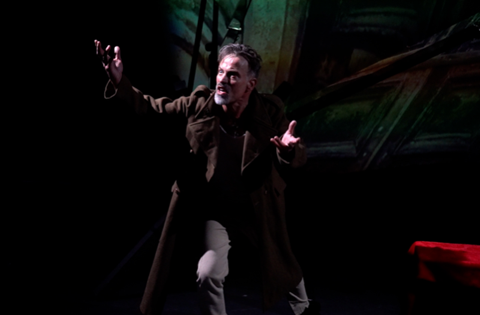This play which merges gospel accounts with modern espionage is Zero Dark 30 pieces of silver. It’s sophisticated, satirical and highly recommended, says Jonty Langley

Strength. Decisive action. A willingness to do what is necessary to protect civilisation from dangerous ideologies, even if that means taking drastic measures against individuals. The charismatic politician behind the podium preaches these things, projecting a Bullingdon Club confidence, with an edge of MI5 ruthlessness. He’s telling the audience about an operation tackling dangerous extremism in the Holy Land, and the operation’s focus is on a radical preacher in Jerusalem who must either be turned or terminated.
It could be an episode of Homeland or Le Carré’s The Little Drummer Girl. It’s actually a passion play. Politically sophisticated and satirically clever, but Christian to the core.
The target of this anti-terror operation, we learn, is Y’shua Bar Yessuf, son of a radicalised teenage girl and, according to the man behind the podium, leader of “the most extreme, dangerous and contagious ideology to emerge in the modern era, whose terror activities represent the gravest threat to our interests across the region and the wider world”.
And when you consider the provenance of this description it makes a whole lot of sense. It’s an ideology we’re all familiar with, a set of teachings that have destabilised empires and brought long-accepted practices and attitudes crashing down. It’s even inspired violence, though it’s founder never openly preached violence. It’s an ideology that, in the real world as well as the play, poses a real and present threat to the power structures of the status quo.
The man behind the podium is, of course, Satan. And the extremist preacher he has been trying to either de-radicalise or neutralise is Jesus, known as the son of Joseph, late of Nazareth.
Christianity, according to this play’s vision, is a radical, liberating challenge to hierarchy, wealth, status, discrimination and earthly power. Alongside this radically liberationist understanding of the message is an understanding of the the man, Jesus, that is radically spiritual.
The entire structure of The Devil’s Passion rests on an idea of spiritual ‘gates’ falling as Jesus chooses obedience, faith, humility and love over selfishness, domination and compromise with the established powers and authorities of this dark world.
The ‘gate’ of flesh falls when the radical preacher resists satanic offers of supernatural fast-breaking. The gate of shame falls when the woman with the issue of blood is healed by faith (and touching the hem of Christ’s garment). Enmity, the greed of Mammon and pious religiosity are all temptations, barriers and gates that Christ knocks down. An almost sacramental view of the spiritual structures underlying the temptations and bondages from which Christ came to liberate us.
If you’re looking for a God-free sterilisation of the Passion story, this is not for you. Equally, those seeking a simplistic stage-tract in which Jesus backs up Christendom’s prejudices or Western hegemonies will be disappointed. There is no altar call at the end of this play. And yet I found myself surprised by how moved I was. The quality of the writing, the power of the parallels between biblical and contemporary (an universal human) struggles, and the transcendent meaning inherent in the Passion story cut through my years of parachurch trauma and professional Christian jadedness to excite me again about the Easter story.
The Devil’s Passion is part espionage thriller, part spiritual epic: funny, moving and profound, with the biting wit of The Screwtape Letters and the scope and depth of Paradise Lost. And despite its heady subject matter (Jesus’ temptation, trial and crucifixion) and its apparent ambition (to comment on contemporary repressive politics and present the true spiritual power of Christ’s ministry and sacrifice) it never slips into overly pious lecturing or sentimental spiritual bypassing of big questions.
That’s partly down to Justin Butcher, the author and star of this one-man show, whose range, physicality and sheer power of presence and emotional projection make some moments of this play uncomfortably intense, while making the plot immersive and compelling – even though nothing that happens in a story this well-known can ever truly be a surprise.
The strength of Butcher’s performance and play (and of Guy Masterson-Mastroianni’s direction) is not in how they somehow ‘breathe new life’ into the old story. The story has plenty life of its own. The strength is in how this play strips comforting fictions and self-justifying interpretations like cataracts or callouses from our habituated interpretations of the core story of our faith, reminding us that the Gospel is indeed radical, and not always in harmony with our cultural attitudes and national interests.

The Devil’s Passion is playing on Palm Sunday at Union Chapel, London. It will later tour Italy and Malta. See justinbutcher.co.uk for more information





































No comments yet